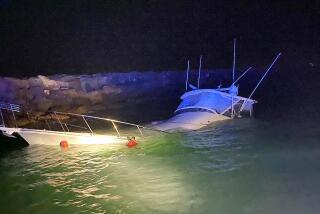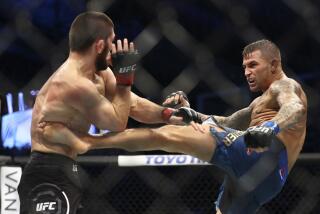A King Mistrial, Then More Trial
- Share via
NEW YORK — The confusion and controversy had all the earmarks of a Don King promotion.
Hardly had a federal judge declared a mistrial Thursday in the fraud trial of the flamboyant boxing promoter, when the jury was ordered back to court.
After jurors declared they were deadlocked, prompting U.S. District Judge Lawrence McKenna’s mistrial ruling, prosecutors immediately asked the 2nd U.S. Circuit Court of Appeals to overturn it and force the jury to resume deliberations.
The higher federal court scheduled a hearing on the prosecutor’s motion for today, and McKenna told the jurors to return to the courthouse in the morning.
The jury of nine women and three men had said in a note to McKenna that it was “irretrievably deadlocked.”
The note also said, “Certain members of the jury, a majority, have reached a conclusion, but we cannot reach a verdict on all of the counts charged.”
Many judges urge jurors to continue deliberating the first time they announce they are deadlocked on some counts of an indictment.
During the six-week trial here, prosecutors charged that King had filed a fraudulent insurance claim with Lloyd’s of London in connection with a scheduled fight between Julio Cesar Chavez and Harold Brazier in June 1991. The bout was canceled after Chavez was injured during training. According to the nine-count indictment, King submitted a bogus contract between himself and Chavez to Lloyd’s, claiming $350,000 in lost training expenses for Chavez.
King, 64, who rose from the gambling halls of Cleveland to manage the careers of such heavyweight champions as Muhammad Ali and Mike Tyson, took the stand in his own defense. He blamed subordinates, saying he had not known they were falsifying documents.
The fight was scheduled for June 28, 1991, at the Mirage hotel in Las Vegas. In May, a month after the bout was announced, Lloyd’s issued a $750,000 non-appearance or cancellation insurance policy for the fight.
The policy covered net losses if either fighter was unable to enter the ring.
Then, eight days before the bout, Chavez was cut on the nose in a sparring session and preparations ended.
Prosecutors charged that King, president of Don King Productions, then had employees create a list of expenses, with documentation, to be submitted to the insurance company in connection with the false claim. Government lawyers said he orchestrated the back-dating of checks.
As part of the scheme, the boxing promoter also prepared and sent to Lloyd’s a document purporting to be the contract between King and Chavez, government lawyers said.
This document “was not signed or authorized by Julio Cesar Chavez . . . and was not the contract entered into by Julio Cesar Chavez and Don King, the defendant, for the Chavez/Brazier fight,” court papers charged.
Prosecutors alleged that King falsely claimed that his firm had paid Chavez $350,000 in training fees and that the money was non-refundable. After being reimbursed by the insurance company in the summer of 1992, King concealed from Chavez that he had received the money, the government charged.
“There’s no question there’s a fraud going on,” Assistant U.S. Atty. Craig Stewart told the jury. “The question is, was Don King involved?”
“You know he was,” Stewart said in his closing argument. “The only person to benefit from an insurance recovery was Don King. He alone stood to benefit.
“This is a one-man show. He is the show.”
King’s attorney, Peter Fleming, in his closing arguments, portrayed King as a generous employer who provided record paydays for other fighters. He said because his client was involved in the promotion of a major heavyweight bout in 1991, he was too busy to take part in a scam.
“Don King is in the middle of promoting the Tyson-[Razor] Ruddock fight, a major pay-per-view fight,” Fleming said. “Mr. Chavez is cut and cannot fight, and [King] says, ‘Ah, I think I will begin an insurance fraud.’ Come on.”
King was the defense’s only witness, testifying that he knew nothing about his company filing papers with the insurance company claiming that Chavez had been paid $350,000 in expenses that could not be recovered. The promoter told the jury that his chief financial officer, Joseph Maffia, had made up the $350,000 figure. Maffia was the prosecution’s key witness.
More to Read
Go beyond the scoreboard
Get the latest on L.A.'s teams in the daily Sports Report newsletter.
You may occasionally receive promotional content from the Los Angeles Times.










